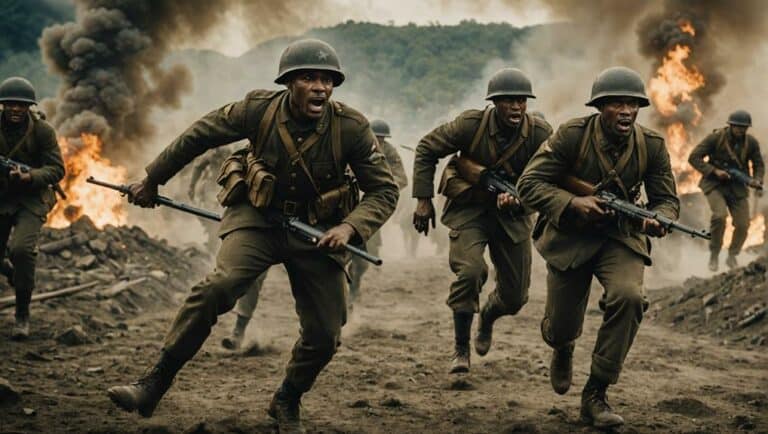The Harlem Hellfighters, the 15th New York National Guard Regiment formed in 1916, faced relentless racism but fought valiantly in World War I, earning international acclaim.
Discover how their extraordinary bravery not only reshaped perceptions of African American soldiers but also inspired future civil rights movements.
Formation of the Regiment
The Harlem Hellfighters were formed in 1916 as the 15th New York National Guard Regiment, mainly composed of enlistees from Harlem. This regiment marked a significant moment in U.S. military history as it was one of the first units to consist mainly of African American soldiers. Governor Charles Whitman spearheaded the recruitment efforts in New York City, and the regiment was commanded by William Hayward. The formation included both white and black officers, showcasing an early attempt at racial integration within the military.
At a time when racial segregation was the norm, the assembly of black soldiers into a dedicated regiment was a bold move. The Hellfighters faced considerable skepticism and prejudice from various quarters, but their formation was a testament to the determination of African Americans to serve their country and prove their worth. Additionally, the creation of this regiment provided an important platform for black soldiers to demonstrate their patriotism and capabilities.
Historical records indicate that the bond among the men grew stronger as they navigated the challenges posed by both training and the pervasive racism of the era. Their formation wasn't just a military maneuver but a significant cultural and social milestone.
Training and Initial Challenges
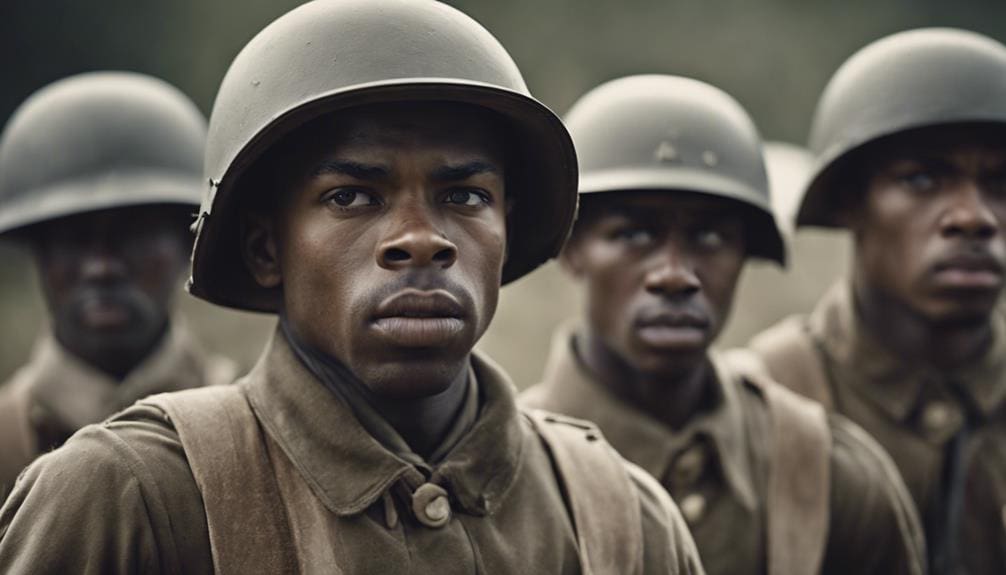
During their training in racially segregated South Carolina, you can see the Harlem Hellfighters faced constant racist insults and threats. Despite this, they formed an unbreakable bond rooted in their collective determination and unity.
Primary sources reveal that the leadership of both black and white officers, including William Hayward, played a vital role in fostering this camaraderie.
Racism in South Carolina
Facing the harsh realities of Jim Crow laws, the Harlem Hellfighters trained in racially segregated Spartanburg, South Carolina, where they encountered relentless racist insults and threats. The pervasive racism in South Carolina during this time was a direct result of the Jim Crow laws that enforced racial segregation and disenfranchised African Americans. In Spartanburg, the soldiers faced a hostile environment that was marked by daily encounters with discrimination, including verbal abuse and physical intimidation.
Primary sources recount that despite these adversities, the Harlem Hellfighters committed to responding with fortitude and dignity. They were instructed to report incidents of racism to their superiors, who sought to address these issues while maintaining discipline and morale.
This period of training under such harsh conditions was essential in preparing the soldiers for the discrimination they'd later encounter both in Europe and upon their return to the United States.
The challenges faced in South Carolina not only tested their resilience but also highlighted the systemic racism prevalent in the South. The Hellfighters' ability to endure and persevere through these initial challenges laid a foundation for their outstanding performance on the battlefield and their eventual recognition as heroes.
Forming a Strong Bond
Enduring relentless racism in Spartanburg, the Harlem Hellfighters rooted their camaraderie in shared adversities, reinforcing their collective resolve during training. Formed as the 15th New York National Guard Regiment in 1916, the unit faced harsh, discriminatory conditions in segregated South Carolina. As they trained, they encountered racist insults and threats from both civilians and fellow soldiers. However, this discrimination only strengthened their determination and unity.
The soldiers pledged to respond with fortitude and reported incidents of racism, fostering a powerful bond among them. This bond was pivotal as they faced unjust challenges from their fellow Americans. The repeated confrontations they endured made them resilient and tightly knit, necessary attributes for the battles ahead.
When they arrived in France in 1918, their camaraderie was evident. French soldiers were pleasantly surprised by their spirit, exemplified by their introduction of jazz music. Later, General John Pershing reassigned them to the French army, where they continued to face and overcome racism.
Despite these challenges, the Harlem Hellfighters fought bravely and longer than almost any other American unit. Their perseverance and bravery earned them the French Croix de Guerre, underscoring their exceptional bond and resilience amidst adversity.
Arrival in France
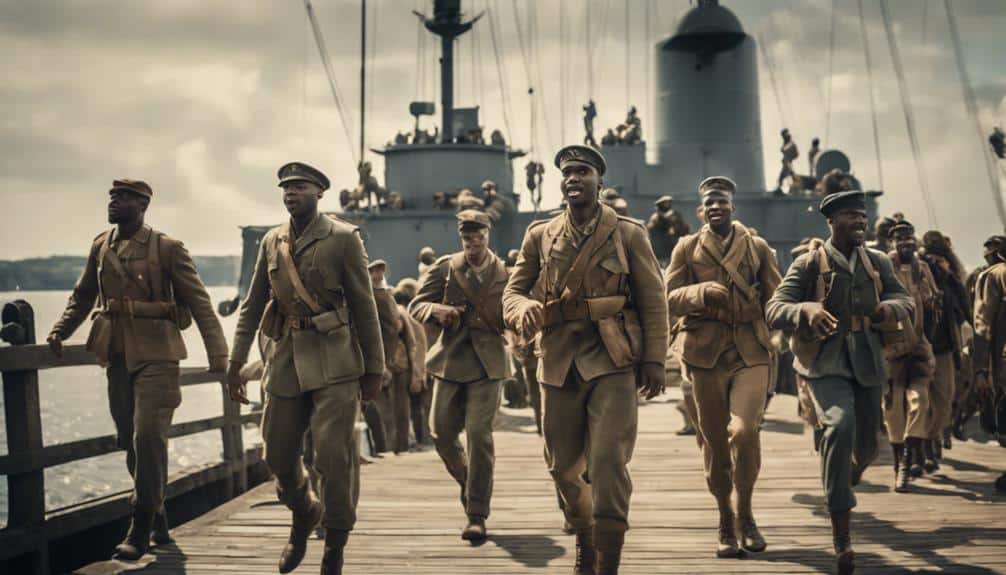
The Harlem Hellfighters' arrival in Brest, France, on January 1, 1918, marked a pivotal moment in their military journey and the broader context of World War I. Upon their arrival, they immediately caught the attention of the French soldiers with their jazz music, a unique cultural contribution that showcased a different side of American life.
Initially, they were assigned to the U.S. Army's Services of Supply, but General John Pershing later reassigned them to the French army. This reassignment was essential. The Harlem Hellfighters offered to reinforce the depleted French divisions, demonstrating their unwavering commitment to the war effort.
Their integration into the French army set the stage for their subsequent combat actions and the bravery that would earn them widespread recognition. Historical records highlight that despite the racial prejudice they faced back home, the Hellfighters were determined to prove their valor on the battlefield.
Their arrival in France was more than just a logistical movement; it was the beginning of a series of actions that would challenge existing racial barriers and redefine the role of African American soldiers in World War I. This moment was the precursor to their heroic deeds, which would soon follow.
Combat Actions and Heroism
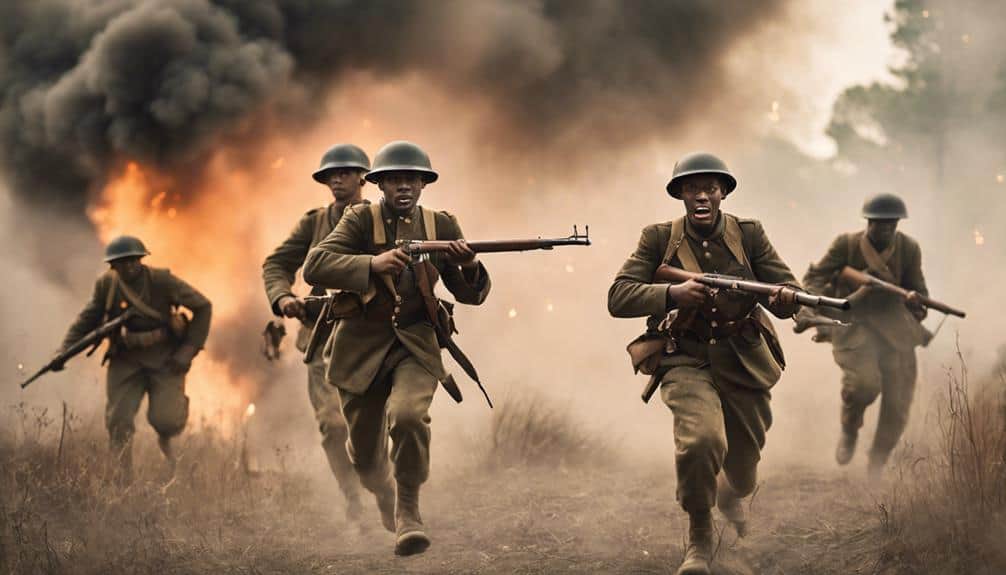
In the fierce battles of World War I, the Harlem Hellfighters demonstrated unparalleled bravery and resilience, earning their place in history as one of the most formidable units in the conflict. This African-American combat unit fought longer in combat than almost any other American unit, facing relentless enemy fire with unmatched courage. Their actions weren't just a tribute to their military prowess but also a powerful rebuke to the racism they encountered both at home and abroad.
Among their ranks, heroes like Henry Johnson stood out for their extraordinary valor. Johnson, in a harrowing encounter, single-handedly killed four German soldiers, showcasing the fearless spirit of the Harlem Hellfighters. Such acts of bravery weren't isolated incidents but rather indicative of the regiment's overall performance on the battlefield.
The Harlem Hellfighters were also the first American unit to receive the esteemed French Croix de Guerre, a testament to their exceptional bravery under fire. Their combat actions played a significant role in reshaping perceptions of African-American soldiers in the military, proving their mettle and challenging racial prejudices. While the Medal of Honor eluded many of them during their time, their heroism undeniably paved the way for future recognition and respect.
Recognition and Awards
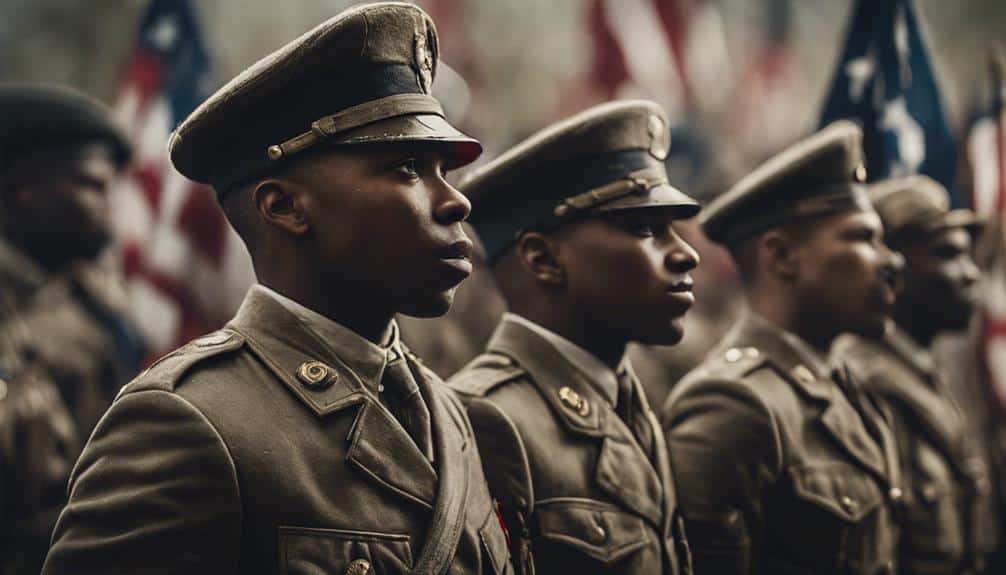
Recognition and awards for the Harlem Hellfighters underscore their extraordinary contributions and resilience during World War I. This African-American regiment, formally known as the 369th Infantry Regiment, demonstrated unparalleled bravery in combat, which led to significant accolades.
The Harlem Hellfighters were the first Americans to receive the French Croix de Guerre, an honor that highlighted their valor and solidified their reputation as one of the war's most celebrated units. The unit's heroism didn't go unnoticed, and several members received individual commendations for their gallantry.
- French Croix de Guerre: Awarded to the entire regiment for their exceptional bravery.
- Medal of Honor: Given posthumously to Henry Johnson by President Obama in 2015.
- Congressional Gold Medal: Set to be awarded to the regiment in recognition of its historical contributions.
Despite the systemic racism they faced, the Harlem Hellfighters were honored with a victory parade in New York City upon their return, a rare acknowledgment of their sacrifices and achievements.
These awards and recognitions not only celebrate their heroism but also mark a significant moment in history, demonstrating the profound impact of this African-American regiment on the course of World War I and beyond.
Return to America
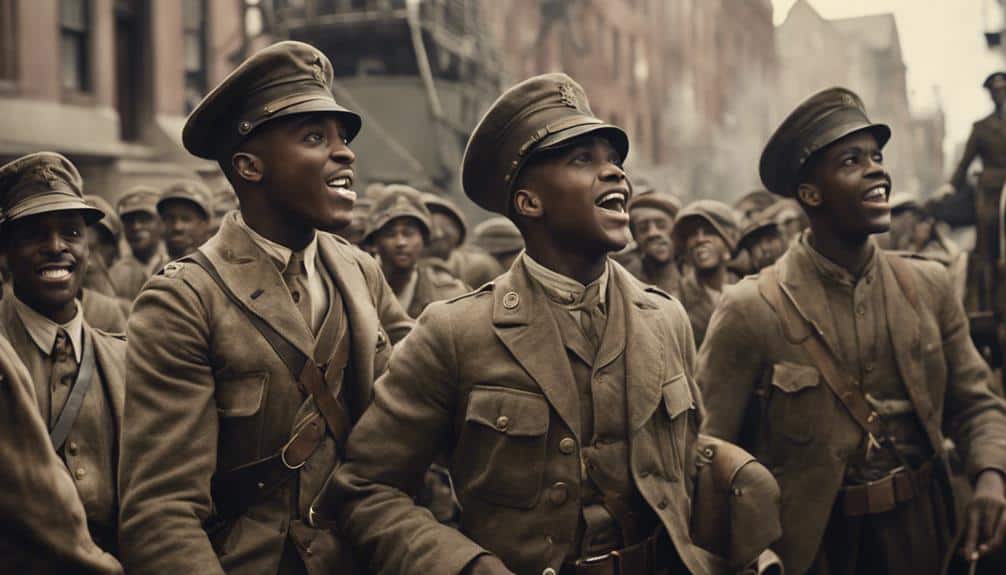
Returning to America, the Harlem Hellfighters confronted stark racism and discrimination despite their wartime heroism. When these American soldiers returned home, their expectations of being honored and celebrated were met with harsh reality. They were unjustly denied participation in the New York City victory parade, an event meant to celebrate the courage and sacrifice of all soldiers. This exclusion starkly highlighted the racial segregation that permeated American society.
The Hellfighters not only faced systemic discrimination but also racial violence upon their return. They were relegated to second-class citizenship, a jarring contradiction to the valor they displayed on the front lines. The soldiers, who'd bravely fought in brutal combat, now confronted hostility and indifference in civilian life. Their contributions were largely ignored, and societal recognition remained a distant hope.
Primary sources reveal the deep scars left by both the war and their subsequent treatment. Many Hellfighters didn't speak about their war experiences, a silence born from the disappointment and struggles they faced in their own country. Their return home was marred by a lack of acknowledgment and continued prejudice, overshadowing their heroic legacy.
Post-War Challenges
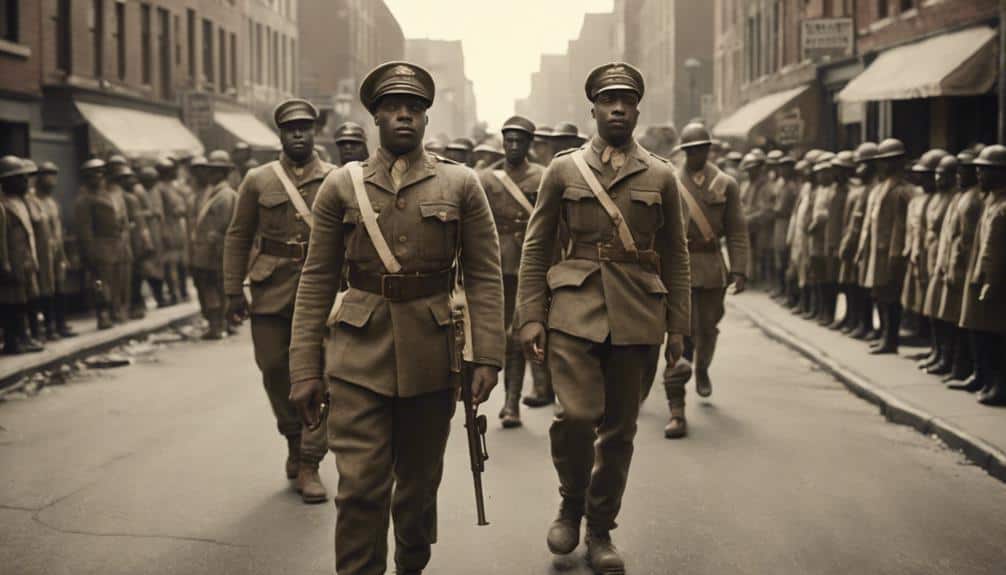
You'd think the Harlem Hellfighters would be celebrated heroes upon returning home, but they faced segregation and discrimination instead.
Primary sources reveal their exclusion from the NYC victory parade and the violent, segregated treatment they endured.
Despite their bravery, they struggled for equal recognition in a society still deeply marked by racial inequality.
Facing Segregation and Discrimination
After World War I, the Harlem Hellfighters, despite their undeniable heroism, faced a harsh reality of segregation and discrimination upon their return to American soil. These brave soldiers, who'd fought valiantly for their country, were confronted with a society that still saw them as second-class citizens.
You'd think their heroism would have earned them equal treatment, but instead, they were denied participation in the NYC victory parade. Their experiences highlight the stark contrast between their valor on the battlefield and the prejudice they faced at home. They encountered:
- Racial violence and hostility
- Segregated facilities and public spaces
- Denied opportunities for recognition and advancement
The post-war period was a time of profound disappointment for the Hellfighters. They'd hoped their service would pave the way for greater equality, but instead, they found themselves battling the same old injustices. Primary accounts reveal that many carried scars from brutal combat and the sting of discrimination, often remaining silent about their war experiences.
Understanding their plight underscores the broader struggle for civil rights and equality in America. The Harlem Hellfighters' story is a powerful reminder of the resilience and fortitude required to fight for justice on both foreign and domestic fronts.
Struggle for Equal Recognition
The Harlem Hellfighters' post-war challenges underscored the harsh reality that bravery on the battlefield didn't translate to equal recognition at home. Upon returning to America, these soldiers faced rampant racism and discrimination. Despite their exemplary service, they were denied participation in the New York City victory parade, a stark reminder of the segregated treatment they endured. This blatant discrimination highlighted the deep-seated racial prejudices that permeated American society.
The struggle for recognition and equality became a significant part of their post-war lives. The Hellfighters, bearing the physical and psychological scars of brutal combat, also had to contend with societal rejection. Primary sources recount instances of violence and hostility directed at these veterans, further complicating their reintegration into civilian life. Many were reluctant to speak about their wartime experiences, a silence born from the dual traumas of battlefield horrors and racial discrimination.
Despite their valor, the Hellfighters' fight for equality was far from over. Their post-war challenges reflected broader societal issues, emphasizing the ongoing struggle African American soldiers faced in their quest for recognition and equality. This struggle remains a critical chapter in the history of race relations in the United States.
Legacy of Resilience
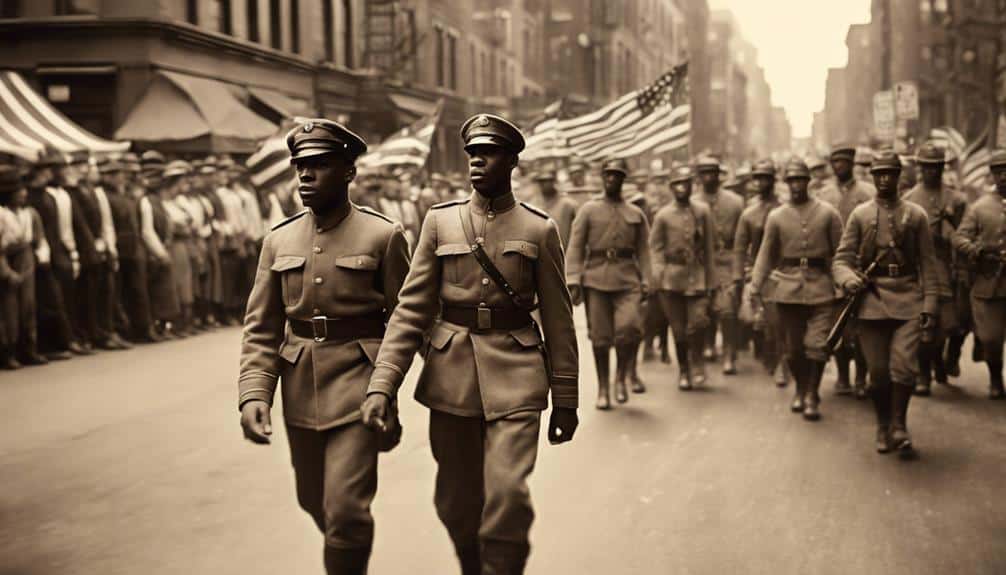
Countless stories of the Harlem Hellfighters' bravery illustrate their unyielding resilience in the face of racism and discrimination. As an African American regiment, they fought not only on the battlefield but also against societal prejudice. Their bravery inspired many and provided a powerful counter-narrative to the discrimination they endured. They demonstrated exceptional valor, often in the most challenging conditions, and their sacrifices paved the way for future civil rights movements.
The Harlem Hellfighters' legacy isn't just about their military achievements; it's about the enduring impact they had on African American pride and unity. They became symbols of perseverance and strength, sending a clear message that racism could be confronted and overcome. Their story remains as relevant today as it was a century ago, continuing to inspire discussions on race, equality, and justice.
Consider their ongoing influence:
- Inspired generations to continue the fight for racial equality and civil rights.
- Encouraged African Americans to take pride in their heritage and contributions.
- Sparked ongoing efforts for inclusivity and honored their courage in contemporary society.
Descendants' Perspectives
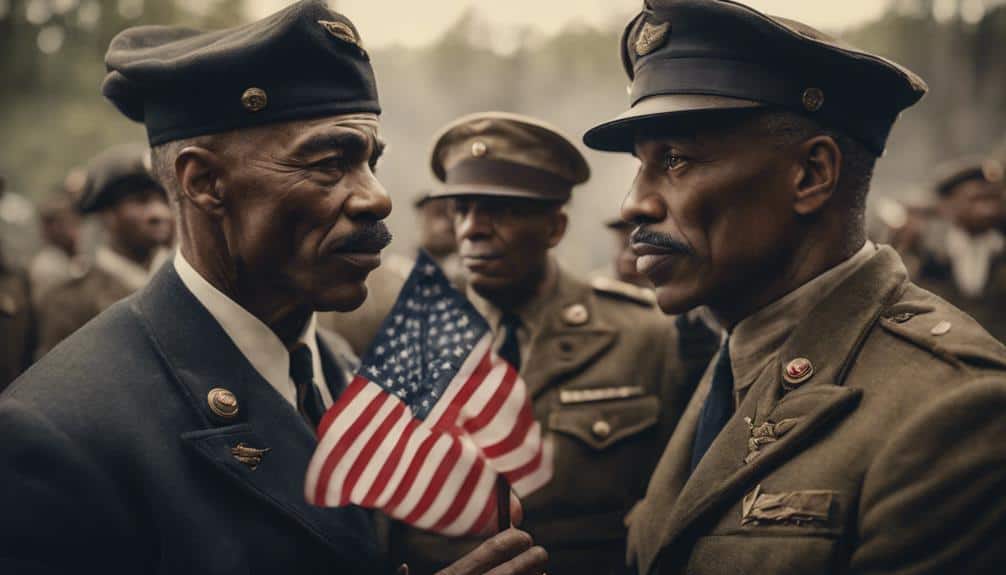
You can see how descendants like Zakharii, Debra, Kheli, and Leander Willetts IV honor their ancestors' sacrifices by preserving the Harlem Hellfighters' historical legacy.
Through genealogy, they've uncovered the profound impact of war on their families.
Their efforts guarantee that the bravery and contributions of the Harlem Hellfighters remain an essential part of community memory.
Honoring Ancestors' Sacrifices
Descendants of the Harlem Hellfighters, such as Zakharii, Debra, Kheli, and Leander Willetts IV, vividly recount their ancestors' wartime sacrifices and contributions, offering a deeply personal perspective on the regiment's enduring legacy. These descendants highlight the bravery and resilience of the Harlem Hellfighters, ensuring their sacrifices aren't forgotten.
Through detailed genealogy, family members uncover the profound impact of war on their ancestors, learning about the Harlem Hellfighters' significant role in history. By honoring their ancestors, these descendants contribute to preserving the regiment's contributions for future generations.
Their efforts emphasize three main points:
- Recognition: Acknowledging the Harlem Hellfighters' bravery and resilience.
- Education: Spreading awareness about their ancestors' sacrifices and contributions.
- Preservation: Ensuring the Harlem Hellfighters' legacy is maintained in historical records.
Preserving Historical Legacy
In their pursuit to preserve the historical legacy of the Harlem Hellfighters, descendants like Zakharii, Debra, Kheli, and Leander Willetts IV actively engage in educational initiatives and community events. These descendants have explored their heritage through genealogy, uncovering the profound impact of war on their ancestors. By sharing stories and participating in public commemorations, they highlight the sacrifices made by the Harlem Hellfighters and ensure their contributions remain a crucial part of American history.
You can see their dedication manifest in various ways. For example, they organize lectures, exhibitions, and school programs that educate others about the regiment's bravery and challenges. Their efforts serve as a reminder of the Hellfighters' resilience in the face of racism and adversity. These descendants also utilize primary sources, such as letters and photographs, to provide an authentic and engaging narrative.
Long-Term Contributions
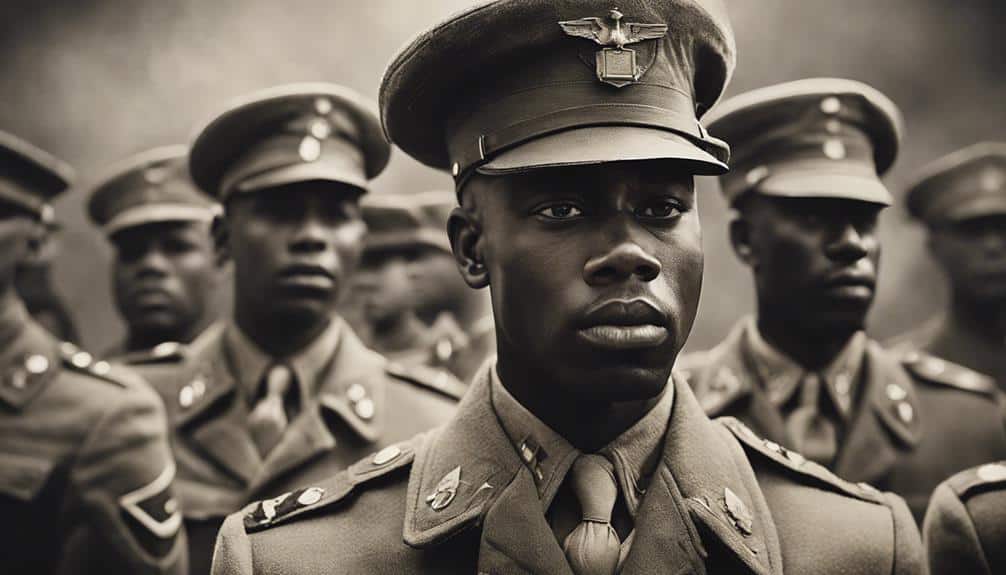
Frequently overlooked but profoundly impactful, the long-term contributions of the Harlem Hellfighters paved the way for future civil rights movements and inspired African American pride and unity. Their legacy symbolizes perseverance and strength, playing a significant role in the fight against racism and injustice. By challenging racial barriers, the Harlem Hellfighters fostered a broader conversation on race, equality, and inclusivity, ensuring their story remains relevant in discussions on civil rights today.
Their bravery during World War I continues to encourage efforts for inclusivity and stands as a testimony to their courageous stand against discrimination. The Harlem Hellfighters' impact on American history serves as a reminder of past injustices and the ongoing fight for equality. Their actions have inspired numerous individuals and movements dedicated to civil rights and social justice.
Consider these significant impacts:
- Inspired Civil Rights Movements: Their determination and bravery laid the groundwork for future civil rights activism.
- Enhanced African American Pride: Their heroism fostered a sense of pride and unity within the African American community.
- Promoted Inclusivity: Their story highlights the importance of fighting for an inclusive society.


